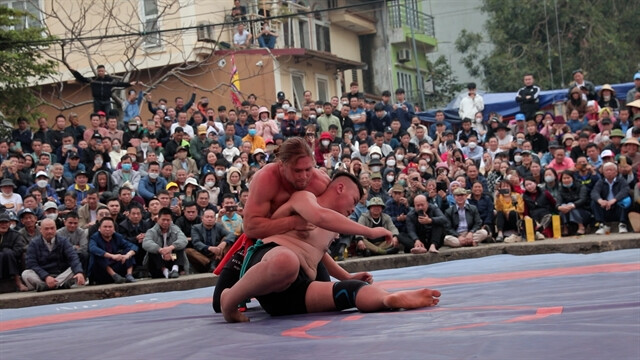
HÀ NỘI – The cacophony of motorbikes, a constant in Việt Nam, was Zakhar Dzmitrychenka's first impression upon arriving in the country. Now, two years later, the Belarusian wrestler navigates those same streets on his own motorbike, often with his wife, heading to traditional wrestling festivals in the villages surrounding Hà Nội. It's a journey that has led him to an unexpected passion: Vietnamese traditional wrestling.
The rhythmic thump of drums, an ancient and vibrant sound, drew him into this unique Vietnamese art form. Just two months ago, he was a spectator. Now, he's a participant, embracing the traditions with infectious enthusiasm. Zakhar has not only found himself captivated by the people and scenery but also by the traditional village wrestling matches, a world away from the professional Greco-Roman wrestling he once knew.
Zakhar's wrestling journey began at the age of six. While his initial training partner soon quit, Zakhar persevered, and fifteen years later, wrestling had become an integral part of his life. "My most cherished memory is when I won an international competition and earned a ticket to the World Championship," he recalls. He competed in high-level tournaments, including the Republic, World, and European Championships.
At 21, he briefly explored the fitness world, but his love for wrestling eventually drew him back to the mat, this time in Việt Nam, where he continued his career in both MMA and wrestling. "I learned about Vietnamese wrestling a month ago when I asked my coach, Nguyễn Khang, who lives in Nha Trang, if there are any wrestling competitions here," Zakhar explained.
His impressions have been overwhelmingly positive. He was immediately struck by the unique atmosphere of the village festivals, the rhythmic drumming, and the enthusiastic cheers of the crowd. "The audience is so close to the ring," he said. "It creates a very special atmosphere."
He also notes the key differences between Greco-Roman and Vietnamese wrestling. "In Greco-Roman, we are only allowed to grab the upper body, but in Việt Nam, it's full body contact, and there's no time limit. This is very good for wrestlers, with a lot more technique," the 29-year-old explained.
Vietnamese wrestling is a fusion of various styles, incorporating elements of Greco-Roman, freestyle, Judo, and Sambo, which Zakhar believes is highly beneficial for MMA fighters. The diverse techniques he's learned have become invaluable assets in his own MMA career. In May, Zakhar will compete for the Lion MMA belt championship, confident that his experiences in Vietnamese wrestling will give him a competitive edge.
Before attending the village wrestling match, Zakhar even took the time to learn the traditional Vietnamese wrestling dance from a local instructor. "The atmosphere is amazing," he said. "The shouts of the people, the sound of the drums, and the traditional Vietnamese dance – it's all very memorable."
The Vietnamese people have embraced Zakhar with open arms, appreciating his passion for and respect of their traditional cultural values. The applause and cheers he receives are a testament to his sincerity.
Nguyễn Thế Tiếp, the organizer of the Chi Đông festival where Zakhar recently competed, shared this sentiment. "The presence of a Belarusian wrestler adds a fresh and exciting element to the festival," he said. "We hope to see more of these cultural exchanges in the future."
Zakhar believes that traditional Vietnamese wrestling will continue to grow and gain recognition, both in Việt Nam and internationally. He also has a message for aspiring athletes, particularly wrestlers: "Believe in yourself, in the training process. No matter how difficult it is, you have to fight."
Zakhar Dzmitrychenka, the Belarusian wrestler with a passion for Vietnamese culture, is writing a compelling story about the intersection of cultures, the spirit of sportsmanship, and unwavering determination on the wrestling mat.
[Copyright (c) Global Economic Times. All Rights Reserved.]






























